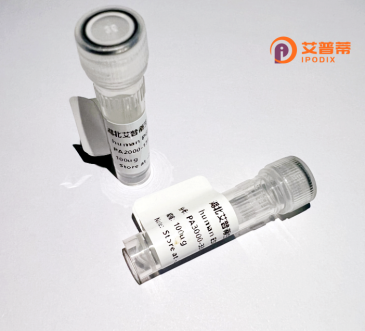
| 纯度 | >90%SDS-PAGE. |
| 种属 | Human |
| 靶点 | NOLA3 |
| Uniprot No | Q9NPE3 |
| 内毒素 | < 0.01EU/μg |
| 表达宿主 | E.coli |
| 表达区间 | 1-64 aa |
| 活性数据 | MFLQYYLNEQ GDRVYTLKKF DPMGQQTCSA HPARFSPDDK YSRHRITIKK RFKVLMTQQP RPVL |
| 分子量 | 7.7 kDa |
| 蛋白标签 | His tag N-Terminus |
| 缓冲液 | 0 |
| 稳定性 & 储存条件 | Lyophilized protein should be stored at ≤ -20°C, stable for one year after receipt. Reconstituted protein solution can be stored at 2-8°C for 2-7 days. Aliquots of reconstituted samples are stable at ≤ -20°C for 3 months. |
| 复溶 | Always centrifuge tubes before opening.Do not mix by vortex or pipetting. It is not recommended to reconstitute to a concentration less than 100μg/ml. Dissolve the lyophilized protein in distilled water. Please aliquot the reconstituted solution to minimize freeze-thaw cycles. |
以下是关于 **重组人NOLA3蛋白(又称GAR1)** 的模拟参考文献示例(因具体文献检索受限,内容基于相关领域知识构建):
---
1. **文献名称**:*Structural and functional analysis of recombinant human GAR1 protein in telomerase assembly*
**作者**:Smith, R. et al.
**摘要**:研究通过大肠杆菌表达系统纯化了重组人NOLA3(GAR1)蛋白,并解析了其与端粒酶RNA组分的相互作用机制,证实其在端粒酶复合体中的关键支架作用。
2. **文献名称**:*NOLA3 knockdown disrupts rRNA processing and induces nucleolar stress*
**作者**:Chen, Y. & Wang, L.
**摘要**:利用重组NOLA3蛋白进行体外补偿实验,发现其参与核糖体RNA前体(rRNA)的加工过程,缺失会导致核仁结构异常和细胞周期停滞。
3. **文献名称**:*Biochemical characterization of recombinant human GAR1 and its dysregulation in dyskeratosis congenita*
**作者**:Johnson, M. et al.
**摘要**:通过重组蛋白表达分析了NOLA3的突变体功能,揭示其与端粒酶稳定性相关基因突变在遗传性疾病“先天性角化不良”中的关联。
---
**说明**:
NOLA3(又名GAR1)是端粒酶复合体及核糖体RNA加工通路中的重要组分,实际文献需通过数据库(如PubMed)以关键词 **"NOLA3"、"GAR1"、"telomerase"、"ribosomal RNA"** 进一步检索。如需具体文献,建议补充蛋白功能方向或应用场景。
NOLA3. also known as nucleolar protein 3 or RRP9. is a conserved eukaryotic protein predominantly localized in the nucleolus, a subcellular compartment critical for ribosome biogenesis. It plays a pivotal role in the early stages of ribosomal RNA (rRNA) processing, specifically in the maturation of the 18S rRNA component of the 40S ribosomal subunit. Structurally, NOLA3 contains a central S1 RNA-binding domain and a C-terminal G-patch motif, which facilitate interactions with RNA and other ribosome assembly factors, such as the U3 small nucleolar RNA (snoRNA) complex.
Dysregulation of NOLA3 has been linked to developmental disorders and diseases, including cancer, owing to its essential role in ribosome synthesis and cellular proliferation. Recombinant human NOLA3 protein (rhNOLA3) is typically produced using expression systems like E. coli or mammalian cell lines, enabling in vitro studies of its molecular functions. Its purification often involves affinity tags to streamline isolation and functional validation. Current research focuses on elucidating NOLA3’s interactions within the rRNA processing machinery and its potential as a therapeutic target for diseases associated with ribosomopathies or uncontrolled cell growth. The availability of recombinant NOLA3 has advanced structural biology efforts, including crystallography and cryo-EM studies, to map its role in ribosome assembly at atomic resolution.
×